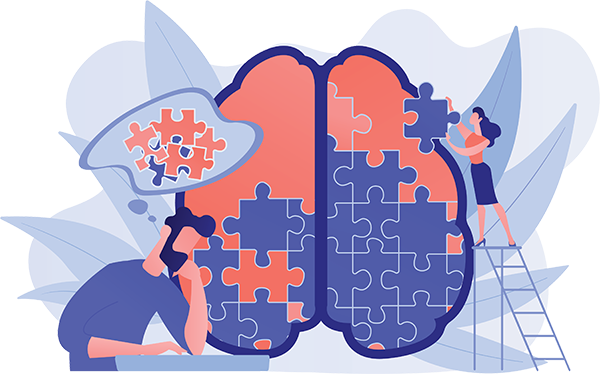We offer various modes of therapy
Psychoanalytic psychotherapy with adults and adolescents
Psychoanalytic and psychodynamic psychotherapy aim to help adults and adolescents with serious psychological disorders to understand and change complex, deep-seated and often unconsciously based emotional and relationship problems thereby reducing symptoms and alleviating distress. This process helps patients gradually to identify these patterns and, in becoming conscious of them, to develop the capacity to understand and change them.


Intensive Short-Term Dynamic Psychotherapy - ISTDP
Our feelings are what make us feel alive and vital, energize us to meet and deal with life’s challenges, and point us in the best direction to get what we really want. Our feelings are what bridge the gap between ourselves and others, enliven our relationships, and help us feel close. And it’s our discomfort with our feelings that keeps us detached from the wisdom and power inside us, and at a distance from others.
Yoga Tries Step by Step to Penetrate the Inner Mystery
The whole yoga is a methodology: how to uncover it which is so hidden, how to open the doors within yourself, how to enter the temple that you are, how to discover yourself. You are there, you have been there from the very beginning, but you have not discovered it. The treasure is carried by you every moment. Every breath you take in or out, the treasure is there. You may not be aware, but you have never missed it.


Dance Studio
Osho defines the real dance and says “Dance, and don’t bother whether somebody likes your dance or not — that is not the question. If you can get dissolved into it, you are a dancer.”
What Is Mindfulness?
When the mind disappears, thoughts disappear. It is not that you become mindless; on the contrary you become mindful. Buddha uses these words “right mindfulness” millions of times. When the mind disappears and thoughts disappear you become mindful. You do things – you move, you work, you eat, you sleep, but you are always mindful. The mind is not there, but mindfulness is there. What is mindfulness? It is awareness. It is perfect awareness.


What is meditation?
Is it a technique that can be practiced? Is it an effort that you have to do? Is it something which the mind can achieve?
It is not. “All that the mind can do cannot be meditation – it is something beyond the mind, the mind is absolutely helpless there.
Psychoanalytic Psychotherapy FAQs
Psychotherapy is a discipline of study and practice that aims at healing psychological problems. Some patients opt only for Psychotherapy for healing, some patients rely only on Psychiatric treatment for healing whereas for some patients both Psychiatric treatment and Psychotherapy are needed together.
Generally 3-5 sessions per is the norm. In case of financial limitations lesser number of sessions per week is also tried.
There are many schools of thought with regard to the structure and function of the psyche (mind) and hence there are many types of Psychotherapies. Psychoanalytic Psychotherapy,Cognitive Behavioral Therapy, Intensive Short term dynamic Psychotherapy, Rational Emotive therapy and logo therapy are major forms (schools) of psychotherapy in practice at present.
Psychoanalytic Psychotherapy is a system of Psychotherapy which is based upon ‘Psychoanalysis’ which is one of the leading schools in Psychology. Psychoanalytic Psychotherapy itself is divided into many ‘types’ and the most common are Freudian Psychotherapy, Jungian Psychotherapy, Winnicotian Psychotherapy, Lacanian Psychotherapy and the Klenien Psychotherapy. Every Therapist practices predominantly any one school of Psychotherapy with influences and eclectic borrowings from the other schools.
For many psychological problems, the causes lie deep in the unconscious mind, mostly related to intensely emotional events, many of which would have happened in early childhood. Psychoanalytic Psychotherapy is the only Psychotherapy that deals and heals such deep seated and long forgotten causes of Psychological Problems. For example a person may have a compulsion to wash hands and he may be washing his hands 15 times in a day. The roots of this problem may lie in his unconscious mind and relate to some events which happened when he was 3 to 5 years of age. Psychoanalytic Psychotherapy is the only therapy that goes to the roots of such problems. Also studies have shown that problems healed with Psychoanalytic Psychotherapy have very less chances of relapse compared to other forms of therapy since it heals the problem at its roots.
Psychoanalytic Psychotherapy is chosen for broadly two reasons. One is to heal one’s psychological problems and second is to know oneself better so one can improve one’s quality of life. It is not necessary that only patients seek this form of therapy. Many healthy individuals motivated by the Socratic desire to know oneself also choose this form of psychotherapy. In problem specific terms patients struggling with a range of psychological problems like Anxiety, Depression, Bi-Polar Disorder, Obsessive Compulsive Disorder and others seek Psychoanalytic Psychotherapy.
Generally it is 45-50 minutes per session. Not more than one session per day is preferred.

Who can benefit from psychodynamic psychotherapy ?
- Have you found yourself a recurring relationship pattern that you know you don’t like?
- Have you ever wondered why you feel you aren’t moving forward either in relationships or at work?
- Do you suffer from guilt every time you experience a conflict?
- Do you suffer from anxiety, headaches, tiredness, multiple aches and pains
- which seem to come and go but never leave you and cannot be explained to have been caused by medical reasons.
How is this psychotherapy different from conventional counseling ?
- 1. The Therapist does not advise.
- 2. It is a Psychotherapy requiring will and high Motivation.
- 3.The Focus is on conflicts and emotions
- 4. Relationship with the Therapist is actively worked upon by the client and the Therapist to get maximum benefit out of Therapy.

Basic Questions
Unlike the supportive conversations that you hopefully have with your loved ones, therapy discussions are structured by trained therapists according to principles scientifically demonstrated to be helpful. This involves far more than talking about your problems in the hope that someone will listen and offer practical solutions or reassurance. Of course, therapy can include these aspects, but therapists aim to achieve lasting growth by helping you find ways of seeing, thinking and feeling that leave you more capable and prosperous. There are many forms of psychotherapy and they differ in a variety of ways, but they also share a great deal in common. All therapists aim to provide a safe, confidential, non-judgmental, consistent, reliable and accepting encounter with a helpful human being. Therapy is designed so that you and your internal life take centre stage.
You are the one who shares personal details about your life, while the therapist works to help you to understand the situation you face and to be as open as possible. This includes the therapist refraining from sharing their political, religious, moral or any other views that might make it more difficult for you to be yourself. Some forms of psychotherapy involve a meeting between one patient and one therapist, while others involve more, e.g. group or couples therapy. Sessions are usually less than one hour but it is not unusual for initial assessment sessions (or groups) to be scheduled for longer. This is because assessments sometimes require many questions to be asked, whereas subsequent sessions might be less structured.
Yes! Therapy does work. Research has shown that people who attend therapy are more likely to be better off than those who don’t. This finding has been repeatedly confirmed and researchers are now turning their attention from asking “Does therapy work?” to the more complex issue of “Which therapy works best? For whom and under what circumstances?”
Apart from the obvious expected benefits like feeling and functioning better, therapy can also improve relationship skills and work performance, and reduce the number of times a person sees a doctor or is admitted to hospital.
Some issues that therapy is known to be helpful for include:
• Addictions
• Anxiety
• Depression
• Emotional crises
• Low self-esteem
• Obsessive-compulsive disorder (OCD)
• Personality disorders
• Phobias
• Post-traumatic stress disorder (PTSD)
• Relationship and family problems
• Schizophrenia
No two therapists are the same, not even two therapists working under the same professional title, using the same orientation and applying the same techniques. The good thing about this is that you don’t need to write off an entire approach if you are unfortunate enough to have had a bad experience with one therapist. Try someone else; you might be pleasantly surprised. There are some things that you can expect from most therapists. Most will want to meet once or twice weekly for under an hour (45 – 50 minutes). During this time, you will probably do much of the talking as your therapist works to understand the nature of your difficulties. Think of these meetings as an opportunity for the two of you to get to know each other a bit and decide if this relationship will work.
Some therapists will approach these initial (and perhaps later) meetings in a structured way, asking questions and gathering details about what brings you. Others might follow your lead and quietly form an impression of how to be helpful. At the end of your first session, some will invite you to return to continue where you left off, while others may have already formulated clear ideas about how to proceed. Neither approach is better or worse; the important thing is that the two of you are starting to clarify your expectations, establish a good rapport and build a connection.
It’s understandable to want a professional who will tell you how to go about fixing things, but this is rarely the best approach. As the word suggests, psychotherapy is a therapy of the mind. The aim is to help you to change internally so that you can live more productively. Having a therapist solve problems for you or tell you what to do ‘out there’ feels nice, but it is a red flag and fosters dependence. Be prepared for the process to unfold gradually, to work together with your therapist, and to take risks as you feel ready and able to. This includes things like being open to feeling vulnerable, acknowledging the part you might be playing in something, or allowing yourself to trust your therapist.
Working towards trust is an important part of most psychotherapies. You probably sought help because you have been suffering. Therapy involves talking about this and so stirs up painful memories, feelings of frustration, and sometimes shame-filled disclosures. A good therapist will guide you through this and will understand that this is difficult and takes time. Feel free to let them know how you are feeling, even if this involves your negative or positive feelings towards them. It’s okay to have mixed feelings about therapy and to let your therapist know if you have doubts about the sessions.
The length of therapy will depend on a few factors including your therapist’s talent, your goals, the type of difficulties you are working with, and your level of commitment to the process.
Therapies that aim to reduce one symptom (e.g. fear of flying) or that have a clear, focused goal (e.g. teaching relaxation techniques) are usually shorter-term (months) than those aiming for broader, less defined changes (years). Examples of the latter include aiming for greater emotional maturity or deeper interpersonal relationships. Also, some difficulties are easily addressed while others prove difficult to change and sometimes form part of a severe and chronic condition.
The length of therapy often has little to do with what is needed and might be prescribed by practicalities such as finances and clinic policies. In instances where a therapy is cut short because of financial and policy restraints, it is helpful to think of your therapy as one step along a journey that may need to be revisited from time to time. Don’t blame yourself if you aren’t well at the end of a limited service, or relapse shortly after that time limits are often based on available resources and not on what’s in the best interest of each person’s situation.
It is acceptable to participate with your therapist in setting goals and establishing the type of work that you are looking for. This is also something that is likely to change over time, and you can feel confident about revisiting these issues as and when needed.
As with most things in life, the more you put in, the more you will get out. In therapy, this refers to how often you attend, how engaged you are during the sessions, and then how hard you work on the issues that brought you to therapy between the sessions. The time you spend with your therapist is important and can provide a large part of what you need, but you will probably discover that being in therapy often means thinking about things in new ways for much of the time, including between the sessions.
The two most important things you can do to get the most out of therapy are: 1. be open with your therapist, and 2. attend the sessions. Being open is something many of us find more difficult than we would like. Even people who seem to be publicly open about the most personal things are often quite reluctant to talk about a host of ordinary things that would surprise you.
A significant part of many therapies is having the opportunity to share things with another human being that you would find difficult to tell your closest loved ones. This can be for a whole range of reasons, but shame and embarrassment are the most common. Openness is a quality best worked towards gradually. Blurting out all your secrets can be counterproductive since it might leave you feeling terrible, and this approach probably won’t change much.
Change comes from getting to a place where you trust your therapist enough to risk telling them. Repeatedly discovering that they aren’t driven away is transformative and can alter how you start to relate to yourself. In instances where it’s just too difficult to be open, the best strategy is to be open about why it’s too difficult. That way you are starting to understand what holds you back, while letting your therapist know that there is more and that you will get there in due course.
Attendance is also very important. You aren’t in therapy if you aren’t in the room as agreed. This may seem an obvious point, but it is a frequent stumbling block to true progress. This is quite understandable: therapy can be painful at times and often involves confronting things that you might be trying to avoid. Attending regularly is the best way forward because it allows you to develop trust more easily, it prevents your session time from being hijacked by the need to update your therapist on recent news, and it helps you build momentum and pick up from where you left off. When you find yourself not wanting to go to a session, try to reflect on why. Could it be that the last one was hard? Did you leave a little angry with the therapist, or is there something you know you need to talk about but don’t want to? These are all good things to work through together with your therapist.
Remember: frequency, regularity and continuity are required to achieve depth.
You should also know that attending therapy, while most definitely a valuable and positive step, is not enough to lead to a healthy and reasonably happy life by itself. You will still need to work towards having the basics in place. These include eating properly, staying fit, socialising, keeping intimate, loving relationships, participating in productive activities, resting, having sex, taking the time to play, etc. etc. etc. Of course, it might be because you are unable to do these things that you are in therapy; unfortunately, the one doesn’t replace the need for the other.
Try to take as much control of your therapeutic process as possible. For example, if someone plans to help you pay the account, still have the account sent to you and arrange for the money to be paid through you to the therapist. Similarly, do call your therapist yourself if you need to cancel, move a session or find yourself in crisis. Therapies that are carried out in this way are more successful because the patient practices taking responsibility, and the therapy is less likely to be hijacked or seem as though another person (e.g. Dad) is pushing the agenda.
This can be a difficult question to address because we all have different ideas about what ‘working’ means. Some enter therapy hoping to eradicate their need for others. Since humans are more like pack animals than lone leopards, this is not possible. The therapist might feel things are proceeding well if the person starts to understand their aversion to neediness, but the person may see this as a failure. Agreeing on clear goals (e.g. date more) makes it far easier to evaluate how things are going, but circumscribed goals rarely do justice to the complexity of living. In fact, many people only realise what they wanted out of the therapy quite some way into it. Also, different kinds of difficulties respond to therapy in different ways, so it isn’t always possible to sketch out clear guidelines regarding how to tell if things are going well.
Having said that, there are ways to tell if things are working out or not. You should have a gradually deepening sense that the therapist you are working with is engaged with and interested in you. As time goes on, they should appear to be reliable and consistent, and they should be developing an understanding of the challenges you face. Your sessions should not frequently be rescheduled and cancelled by your therapist, and you can expect that them to remember at least the main elements of your story.
Many people will start to feel better soon after entering a psychotherapy process. Taking steps towards changing in positive ways and finally having someone listen with sincere interest is uplifting by itself. Lasting change takes a little longer, but you should soon notice that you start to think a little differently about your life. These small changes are usually accompanied by a sense of hope, but some can also be quite painful. For example, it might initially hurt if you have been getting into trouble because you have found it difficult to think about certain things, and you have now found the courage to start doing so.
Progress in therapy is rarely one straight line upwards. As with climbing a mountain, you may find yourself descending into small valleys even though the overall trajectory is up. Don’t be discouraged; this is normal. Setbacks are an opportunity to learn something. The whole picture is what’s most important. Therapy is not easy; some patterns have been in place for decades, and it takes some effort and patience to shift them. A more productive and fulfilling life is possible.
• Are you socialising more or at least feeling less isolated?
• Is it any easier to be productive?
• Do you feel more connected to yourself or others?
• Have you been able to broach topics in therapy that you never thought you would?
• Do you like yourself more?
• Can you have more fun than before?
• Is hope a little more present?
• Do you notice any areas improving in your life? E.g. work, love, play?
• Are you more honest with yourself?
• Do you feel challenged to grow?
• Have other people’s actions started to make more sense?
• Are you feeling better or more confident?